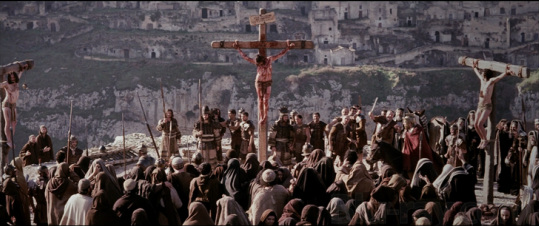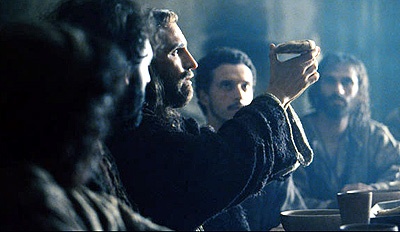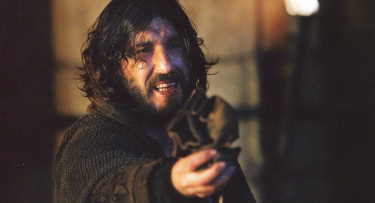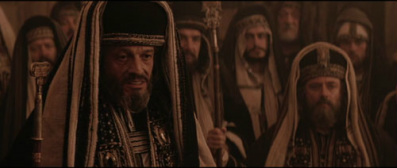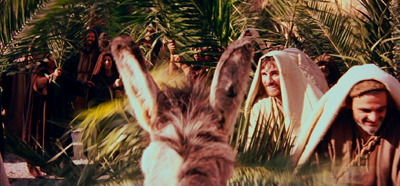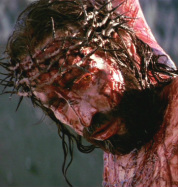 The Gospels only record Jesus speaking seven times while hanging on the cross. Since the cross was the climax and fulfillment of His mission, these words are not idle or inane. Listed chronologically and explained below, these words included: 1
0 Comments
Jesus rose from the dead on Sunday resulting in THE day of Conquest! When the women visited the tomb they found the soldiers gone and the stone rolled away...and it was empty. When they reported it to the disciples, Peter & John found it empty. Then Jesus started making many post resurrection appearances, first with Mary Magdalene & the other women, then the two disciples on the road to Emmaus, then finally to the disciples in multiple instances starting in the Upper Room. Jesus commissioned His disciples to continue His mission to all the nations of the world in his authority. He then appeared to them over a period of 40 days opening their minds to all the Scriptures said about Him. These 40 days included a trip to Galilee to receive the Great Commission, and then again in Jerusalem He gave them the Great Commission (again!) before blessing them and ascending to Heaven awaiting His second coming.
Saturday was the Sabbath, a day of rest in which no work was done...except the guards who were busy guarding the tomb, but they weren't Jews.
Good Friday, THE day of consummation, began early with a trial with Annas, a Jewish trial at Caiphus house (where Peter denied Christ), a trial in the temple with the Sanhedrin (when Judas hung himself), a Roman trial with Pilate, a Galilean trial with Herod Antipas, & final trial with Pilate again as he tried to avoid crucifying Christ via flogging, scourging, and releasing Barabbas. Once convicted for sedition (misinterpreting Christ's kingly claims), Christ was mocked by Roman Soldiers with a crown of thorns, then stripped and beaten. Christ was then led to Golgotha carrying His own cross (until Simon of Cyrene had to intervene), where He was nailed to the cross, which was erected between two criminals and bore the message “This is Jesus of Nazareth, the King of the Jews.” The soldiers, Pharisees, & crowds derided Christ, but He prayed for their forgiveness. When the thief repented Christ promised him paradise. Christ then assigned his familial responsibilities to John. At noon when darkness covered the land Christ lamented separation from God as He took on God's wrath. Christ then fulfilled Psalm 69:21 saying “I thirst.” Christ died after two final words: “It is finished,” & “Father, into your hands I commit my spirit” as Jesus voluntarily died at the completion of His mission. At His death there was an earthquake in which the temple curtain was torn and saints were resurrected and appeared to many, resulting in the belief of many including the Roman Centurion. His body pierced to confirm death, Jesus's body was laid in a tomb covered with a stone and guarded by Roman soldiers.
Consecration occurred Thursday, with divine preparations for the Passover meal and the Upper Room Discourse where Jesus' washed His disciples' feet, identified His betrayer, redefined greatness, foretold Peter's denials, and instituted the Lord's Supper. The Discourse continued covering worldly opposition, the Holy Spirit, and prayer for all believers while walking to the Garden of Gethsemane. Once there, Jesus prayed all night asking God to change the plan, but Jesus accepted His mission as Judas arrived with soldiers to arrest Jesus.
Wednesday was a day of Conspiracy as Judas agreed to betray Jesus. Judas goes to religious leaders asking how much they will pay Him to turn Jesus over to them. They give him 30 pieces of silver and speed up their plans to take Jesus now instead of waiting until the crowds disperse.
On Tuesday, a day of Controversy, the Twelve find the cursed fig tree withered which Jesus uses an illustration for Faith, stating that even a little bit of faith can move mountains. Then Jesus' authority is questioned in the Temple courts by three groups . Deflecting questions on His authority, paying taxes and resurrection, Jesus asks questions regarding John the Baptist, and three parables on Israel's displacement when none will answer, and His relationship to David. Once silence reveals the guilty, Jesus pronounces woe oracles. Later, Christ gave the Olivet Discourse to His disciples to speak prophetically about the temple which they marveled, signs of the end times, and His own second coming as they walked to the Mt. of Olives. Jesus concluded with five parables on being watchful and faithful.
Jesus then returned from Bethany Monday morning beginning a day of Confrontation. First He cursed the fig tree for making a splashy show of leaves but not having any fruit for He was hungry. This was an enacted parable for the Temple cleansing that immediately pursued (this is actually the 2nd Temple cleansing in Jesus' ministry).
Since the gospels are Passion narratives with extended introductions, and the crux of the Christian faith occurred in this ten day span, correctly chronicling its key events is paramount. Only after piecing the Gospels together chronologically can a true picture of what transpired be accounted for. The events of Passion week began Friday, “six days before Passover” (Mark 12:1), in Bethany at the home of Lazarus and his two sisters Mary and Martha. The night Jesus arrived, probably after sunset, Mary anointed Jesus' feet with costly perfume, wiping them with her hair. Jesus' defends this act as preparation for His burial when Judas Iscariot complained of the unnecessary waste.
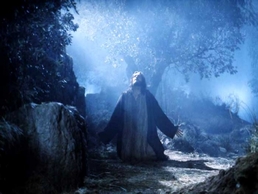 Is Jesus A way? or THE way? “saying, 'Father, if you are willing, remove this cup from me. Nevertheless, not my will, but yours, be done.' And there appeared to him an angel from heaven, strengthening him. And being in an agony he prayed more earnestly; and his sweat became like great drops of blood falling down to the ground” (Luke 22:42-44). Is Jesus the only way? Or is Jesus a way among many alternatives? If paths to the Father exist other than the cross, then Jesus' anguish in Gethsemane doesn't make sense. Jesus entirely life and purpose has been about His mission, and yet now at the time of its consummation it would seem to appear that He is having second thoughts about completing it. For Jesus knows the true cost of what it will take to pay the penalty for the sin of man and to achieve justice, satisfying the wrath of God.  "not just my feet..." “Peter said to him, 'You shall never wash my feet.' Jesus answered him, 'If I do not wash you, you have no share with me.' Simon Peter said to him, 'Lord, not my feet only but also my hands and my head!' Jesus said to him, 'The one who has bathed does not need to wash, except for his feet, but is completely clean.'“ (John 13:8-10). In the upper room where Jesus was to celebrate the historic Passover meal with His disciples and institute the Lord's supper, Jesus quelled an argument about who would be the greatest by taking the form of a menial servant and washed their feet. However, when Peter refused, the Lord's response indicates something greater is being represented than a simple foot washing, for if Peter denies being washed he'll have no part in Christ.  Was it more than just silver? Then Judas Iscariot, who was one of the twelve, went to the chief priests in order to betray him to them. And when they heard it, they were glad and promised to give him money. And he sought an opportunity to betray him. (Mark 14:10-11) There has been much speculation regarding Judas' motives in betraying Jesus, but in the end they are just that speculation. The only reasons the Gospels record are those of greed.  those in prison...for the sake of the gospel “And the King will answer them, 'Truly, I say to you, as you did it to one of the least of these my brothers, you did it to me.'” (Matt 25:40) “Then he will answer them, saying, 'Truly, I say to you, as you did not do it to one of the least of these, you did not do it to me.'” (Matt 25:45) “And these will go away into eternal punishment, but the righteous into eternal life." (Matt 25:46) Jesus concluded His Olivet discourse by speaking of the final judgment that will commence at His return, probably to impress “upon his disciples the gravity of the commission to be heralds of the kingdom of the rule of God” (Howell, 302). To convey such eschatological matters, Christ borrowed a well known “end of day” scene in Palestine where “shepherds commonly herded sheep and goats together but separated them at day's end (sheep, with heavy wool, needed less shelter than goats)” (Elwell, 754). The sheep (animals of greater value and lighter color) represent those who will be redeemed while the goats represent those who will be damned. As Jesus recalls the great works of the sheep and great omissions of the goats to Him, both groups question when they ever did/didn't do these things for Jesus. Jesus then identifies that whoever served “the least of these my brothers” served Jesus. The crucial question then becomes, who are these “brothers” that we should be serving?  The truths certainly add a whole new dimension of fear to the commission of sin, for it is entirely possible for the Lord to return during our “worst moment.” Ironically, the truths revealed in the Olivet Discourse about being watchful for the end of all seem to entail a consistent living of the Christian life as if the end is never coming. For if we live each day expecting it to be the end, we will fail to be fruitful and consistent in pursuing God's Mission (as the some of the Thessalonians had ceased to be productive, awaiting the end of all things). In another sense it questions the Western notion of retirement, for we may retire from our earthly career but we should never retire from pursuing God's Mission. 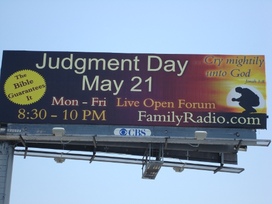 5-21-11 passed & we're still here “Therefore, stay awake, for you do not know on what day your Lord is coming.” (Matt 24:42) Every generation seems to have a misguided teacher who fails to heed the teachings of Jesus when asked about the end of the Age and fulfillment of His Kingdom. Beginning the Olivet Discourse, Jesus was clear through these five parables that life would continue as normal and believers are to live “responsibly, compassionately, courageously, and expectantly during the Lord's absence...” until “the end” (Howell, 301).  We are the “Pharisees of Today.” The 7 Woes of Christ contextualized for a modern audience.
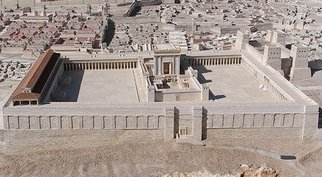 On Monday of Passion week, Jesus is confronted by the chief priests and elders of the people while He was teaching in the temple courts. After He deflects their question regarding whether He has authority to teach, He trounces them with three questions in parable form regarding whether they are citizens in the Kingdom community of God for they've failed “to pay attention to the initiatives taken by by God” (Nolland, 867).  In biblical times when the lingua franca was koine Greek, δόξα referred to one's “reputation” in regular Greek literature. However, since the New Testament consists of Greek words filled with Hebrew meanings, δόξα took on a new meaning when the Hebrew word for the experience of God's presence (literally a form of the word “heavy” in Hebrew...one might say God's presence was a “weighty matter”) was loosely translated as “God's reputation” in the Septuagint (LXX, the Greek version of the Old Testament) (Larkin, William J.). The author John, being a good Hebrew (along with most other biblical writers), still understood the original Hebrew sense of the word “glory” and so it took on a unique concept – "manifested majesty." The “weight” of God was thought of as His essential being manifested for all to see. Since, God is hidden, or better invisible, God reveals Himself through Jesus Christ, God's literal manifested essential being of majesty. As a result, Jesus taught that He “exegetes” the Father, repeatedly stating variations of “Whoever has seen me has seen the Father” (John 14:9). Why did Jesus curse the tree which would not be expected to bear fruit at this time anyway?3/6/2012  “And seeing in the distance a fig tree in leaf, he went to see if he could find anything on it. When he came to it, he found nothing but leaves, for it was not the season for figs. And he said to it, "May no one ever eat fruit from you again." And his disciples heard it.” (Mark 11:13-14). As the Lord of creation, Jesus would have known when the season for figs was, yet the tree is cursed for not producing fruit out of season. Taken by itself this story almost sounds like it came from one of the apocryphal gospels, which show a sideshow Jesus using His miracle powers for personal entertainment (or just because He can). Yet, its placement in Matthew and Mark and the historic use of a fig tree as symbolic of Israel's spiritual condition shed light on the meaning of Jesus action. The context thus reveals it to be “bookending” Christ's second cleansing of the temple. 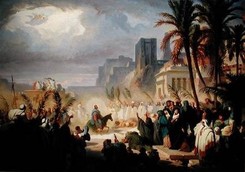 Felix Louis Leullier, 1811 All four gospel accounts record Jesus' triumphal entry into Jerusalem during the Passover on the first Sunday of Passion week, where the crowds readily welcomed Him spreading their cloaks and palm branches on the road before Him. All four accounts also show the crowd quoting Psalm 118:26, which was unarguably a Messianic Psalm, but whose meaning had been confused as a ritualistic welcome for all pilgrims. Thus, the Truth of Christ was hidden in plain sight, as the crowds saw what they wanted to see in Jesus – a fact attested to the wide range of acclamations recorded from the crowd.  Up a Tree “And Zacchaeus stood and said to the Lord, 'Behold, Lord, the half of my goods I give to the poor. And if I have defrauded anyone of anything, I restore it fourfold.' And Jesus said to him, 'Today salvation has come to this house, since he also is a son of Abraham” (Luke 19:8-9). Jesus insists on giving sinners a chance to repent. Jesus showed that “anyone” can be restored to the Father through the story of Zacchaeus when He worked the “saving transformation on a man who's situation seemed to be one of double jeopardy: he is both a chief tax collector and a man of wealth” (Nolland, 904).1  "And everyone who has left houses or brothers or sisters or father or mother or children or lands, for my name's sake, will receive a hundredfold and will inherit eternal life. But many who are first will be last, and the last first. For the kingdom of heaven is like...” (Matthew 19:29-20:1a) It has become common knowledge that God will bless people 100 times over (or with “100% interest”) for what they sacrifice for the sake of the Kingdom. However, because this parable has been lifted from the context of Jesus' larger teaching (since Jesus is the most misquoted person in history), people have used it to support their worldly inspired visions of a material heaven.  “I tell you, this man went down to his house justified, rather than the other. For everyone who exalts himself will be humbled, but the one who humbles himself will be exalted." (Luke 18:14). As in Luke 14:11, Jesus illustrates again illustrates the concept of the “upside-down Kingdom.” For justification cannot come by works, by religion, or any other man made attempt to reach God. Christ is clear that it is only through recognizing our helplessness and repenting of our failure that we shall be found, just as He explained repeatedly that “whoever finds his life will lose it, and whoever loses his life for my sake will find it” (Matthew 10:39, Matthew 16:25, Mark 8:35, Luke 9:24, Luke 17:33). Even in the Old Testament, again and again, disaster is promised to be averted if only God's people will humble themselves and repent of their ways (2 Chronicles 7:14, 33:23, 36:12, Ezra 8:21)! It's a paradoxical principle of humiliation before exaltation, which is seen best in Christ's ministry on earth.  And the Lord said, "Hear what the unrighteous judge says. And will not God give justice to his elect, who cry to him day and night? Will he delay long over them? I tell you, he will give justice to them speedily. Nevertheless, when the Son of Man comes, will he find faith on earth?" (Luke 18:6-8) Jesus told two parables to his disciples regarding the nature of how they should pray: 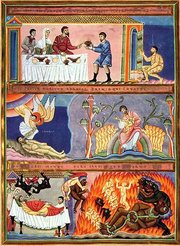 Codex Aureus of Echternach “The poor man [Lazerus] died and was carried by the angels to Abraham's side. The rich man also died and was buried, and in Hades, being in torment, he lifted up his eyes and saw Abraham far off and Lazarus at his side.” (Luke 16:22-23) While the story of Lazerus and the rich man is a parable, that doesn't negate the Truth elements depicted in it. Jesus is never known to fabricate or repeat myths even in his parabolic storytelling. Thus, even if the events described didn't happen historically (though Lazerus is the only named character in a parable), the |
AuthorBrett Yardley: Categories
All
Archives
January 2019
|


